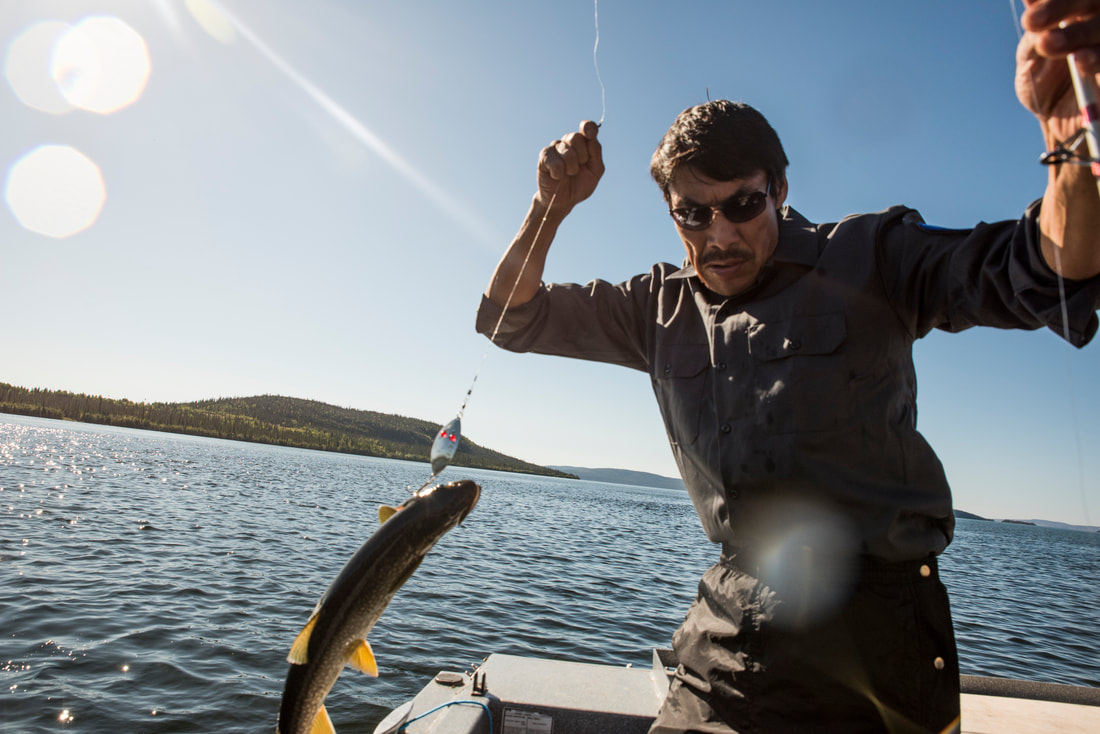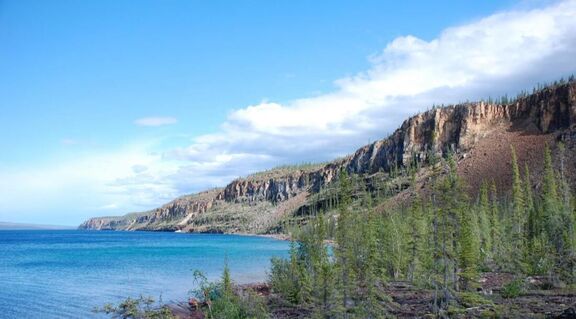|
This is the second in a series of profiles about the staff, leaders, and community members who are hard at work implementing Łutsël K’é Dene First Nation's vision for the Thaidene Nëné Indigenous Protected Area. You can read the other profiles here. Being hired as a junior guardian with Ni Hat’ni Dene was a dream come true for Chase Lockhart: “I really like to go out on the land. I like hunting, fishing, camping, trapping.” Born and raised in Łutsël K’é, Chase’s love for the land comes from spending time out with his family, but especially his grandparents, Joe and Bernadette Lockhart. In addition to passing on the skills needed to survive in the bush, Bernadette and Joe taught young Chase the value of respect and helping others. They also modelled the importance of taking care of your things and yourself. In addition to the opportunity to spend time on the land, Chase enjoys the variety of the role: “It’s always different what we are doing,” he explains. “I like getting new ideas.” Travelling with others beyond his immediate family has been an important part of Chase’s education over the last year: “Everyone has their own skills, style, techniques, and teachings. I’m learning from the community.” When asked about his favourite places in Thaidene Nëné, Chase responded, “The whole lake, the East Arm, the tundra.” So all of Thaidene Nëné really, though he did make a special mention of Tł’ombálı Tué (Tent Lake), which Ni Hat’ni Dene visited in the spring as part of their caribou monitoring program. “It was my first time in a long time seeing big herds of caribou like that,” he remembers fondly. In addition to caring for the land and welcoming visitors to Thaidene Nëné, Chase is a role model for young people in Łutsël K’é, a part of the junior guardian job description that he loves and takes seriously. “Some people are losing their ways. They’re not going out. I’m showing them that it’s easy to go out and that this can be a job that you do if you go out and know your teachings.” Chase is the youngest of the current Ni Hat’ni Dene crew, but he has big ambitions. He wants to continue to hone his skills as a land user and pass on what he knows to the younger generations; the guardians are often called up to teach traditional skills as part of youth on-the-land programs. He also wants to learn his language, a goal that is perhaps best achieved on the land, the source of Dënesųłıné. Blog CategoriesThis is the first in a series of profiles about the staff, leaders, and community members who are hard at work implementing Łutsël K’é Dene First Nation's vision for the Thaidene Nëné Indigenous Protected Area. You can read the other profiles here.  Joseph Catholique is a skilled land user, who is happiest when he is outside. Joseph had little interest in school as a young person. He preferred to hitch up the dogs—his grandfather, dad, and brother all had dog teams—and take them out. On his own, he would do day trips close to town. With his family, through, he travelled to the barrenlands. Living and travelling with his grandparents, John and Marie Catholique, and his parents, Judith and Pierre Catholique, Joseph learned how to be self-sufficient. One of Joseph’s responsibilities as a senior guardian wıth Ni Hat'ni Dene, Thaidene Nëné’s Indigenous guardian program, is passing on his knowledge and skills to the junior guardians. He takes this part of his job very seriously: “Whatever I have learned, the skills I have learned from my grandfather, dad, brothers, mum, brother-in-law, sisters, I pass along. It’s important to teach the younger ones so they know. We don’t want to lose that.” In turn, Joseph is learning from the younger members of the crew. “Technology is coming up fast,” Joseph says, referring to the various tools available now for environmental monitoring. “It’s good to know how to use it to do our job.”  Betsı̨ı̨ghıé (Utsingi Point). Betsı̨ı̨ghıé (Utsingi Point). While Joseph loves spending time anywhere in Thaidene Nëné, Betsı̨ı̨ghıé (Utsingi Point) is a particularly special place for him. “I’ve always liked that point, since I was a kid,” he explains. Not only is it good fishing, but it is also a spiritual place. “When we pass by there on skidoo or in boats, we stop to pay the water and the land.” Looking ahead, Joseph has three goals for his time with Ni Hat’ni Dene. First, he’d like to see a greater emphasis on using and passing along the language. Second, he’d like to see a return to using dog teams in Łutsël K’é and thinks the guardian program could provide an avenue for that. Lastly, he’d like to take a small group of young people by canoe from Łutsël K’é to Baker Lake along the Thelon River. |
AuthorWrite something about yourself. No need to be fancy, just an overview. Archives
March 2024
Categories |
CONNECT |
VISIONWe are the Lutsel K’e Dene First Nation. Our vision for Thaidene Nëné is:
Nuwe néné, nuwe ch'anıé yunedhé xa (Our land, our culture for the future). We’re working with our partners to permanently protect Thaidene Nëné—part of our huge and bountiful homeland around and beyond the East Arm of Tu Nedhé. |
